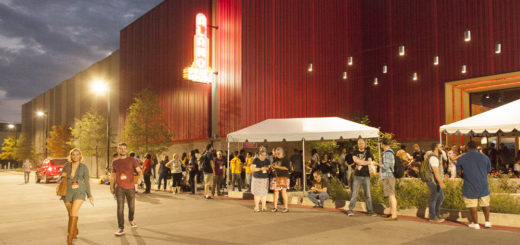Working Man @Nashville Film Festival
Nashville Film Festival Coverage via Jason Sparks, Our Man in Nashville
I’m not going to say that I had a favorite film at NIFF 2019. I am, however, willing to say that I had a favorite actor, by an incredible margin. His name is Peter Gerety; I wasn’t familiar with him, but I know his work will be familiar to viewers of The Wire, a show I have yet to see but fosters in its fans the kind of zealotry to which cult leaders aspire.
If Gerety’s talent as an actor is par for the course in the land of Omar Little, I can see why. Gerety will likely never make the A-list, but as a character actor, he’s pure gold. He is a short, stocky man, nearly wider than he is tall; every square inch of his face is expressive, especially his mouth. As Allery Parkes, the main character in Working Man, his mouth has its own recurring bit of business—whenever Parkes is overwhelmed by emotion, his mouth begins to open and close repeatedly, as if the words to express his emotions are something he has to pump out of a place deep within himself, and the pump needs a lot of priming.
Parkes is frequently overcome by emotion, and not without cause. He’s been an employee at New Liberty Plastics for decades; his daily ritual, which comprises the first few scenes, is and seemingly always has been dressing (in his New Liberty work shirt with his name sewn onto it), packing his lunch (in an old-school metal lunchbox and matching metal Thermos bottle), and walking (past the houses of most of his co-workers, which is…awfully convenient for the narrative, but ok) to work. The day on which we join Allery, as it happens, is to be the last day the factory is open, as New Liberty has been bought by a cannibalistic private-equity firm.
The next day, Allery manages to watch about half an hour of daytime television before he decides he can’t take it. He decides, instead, to get dressed (in his New Liberty work shirt,) pack his lunch (in the aforementioned old-school metal lunchbox), and walk (past his incredulous neighbors) to work, just as he’s always done. He breaks into the factory, and…works. The power having mostly been shut off, he can no longer run the machine that’s been his responsibility forever, but he can and does clean it, and the other machines, and everything else he can find to clean. He repeats this pattern for several days, despite the concerned objections of his wife Iola (Talia Shire, excellent here.) The only thing that really breaks him of the habit is when the police find him at the factory. Thankfully, they drive him home in lieu of pressing charges, where Iola has decided to have their priest come over to talk Allery through this. Allery, a creature of habit, leaves home just as the priest is beginning whatever talk he had in mind—it is, after all, the time of night when Allery takes his walk.
Much to Iola’s consternation, Allery has a visitor the next day as well. It’s one of his neighbors and former co-workers, Walter Brewer (Billy Brown), who we learn has a set of keys to the factory, and is willing to drive Allery to New Liberty, unlock the site, and even work with him. The charismatic Walter is a pleasant shock to Allery, who already seems shocked by everything else in his life; through some clever social engineering, Walter gets the power cut back on to the plant, and convinces most of their fellow neighbors/fellow ex-employees to also return to the plant and continue working, actually using their machines to make the remaining plastic widgets that New Liberty’s clients had ordered. Allery feels alive and useful, as does Walter, as do their comrades; Iola remains unsure, as does the former management of the plant—and its corporate middlemen.
The obvious path for the narrative at this point is the labor/management struggle—will this revolutionary work re-open New Liberty? Will the bosses allow it to continue? We see, of course, the answers to both questions. We also see how this impacts Allery, a heretofore quiet, well-meaning schlub thrust into a leadership role, and how it impacts Walter—and what is motivating Walter to act on this in the first place. Digging deep into both characters yields a story actually more interesting than the David/Goliath economic drama; we learn why both men need to work as badly as they do, and what working helps each man avoid dealing with.
Ultimately, Working Man is a real achievement of a film—come for the expected class struggle, stay for the human backstories; all of the above are thoroughly rendered, and none of the above are predictable. Robert Jury wrote and directed, and manages to yield just enough of each narrative thread to keep us moving forward but wholly incapable of seeing where we’re going. The film was shot in and near Chicago; cinematographer Piero Basso makes great use of the massive steel bridges, piers, row houses, and other elements common to that very industrial part of the world. I mentioned that Peter Gerety and Talia Shire are excellent, ditto Billy Brown, whose charisma as Walter is unquestionable, even as its intensity baffles us (less so Iola; during a scene in which Walter has the Parkses over to dinner, Iola makes a discovery about Walter which fully explains him to her, but not to us—she doesn’t reveal it to us or Allery until late in Act III.) To see Working Man is to briefly live with the employees of New Liberty, and to know their lives inside and out. We see movies to escape, and while we might not dream of escaping to the Rust Belt, we take a thorough journey there.






















